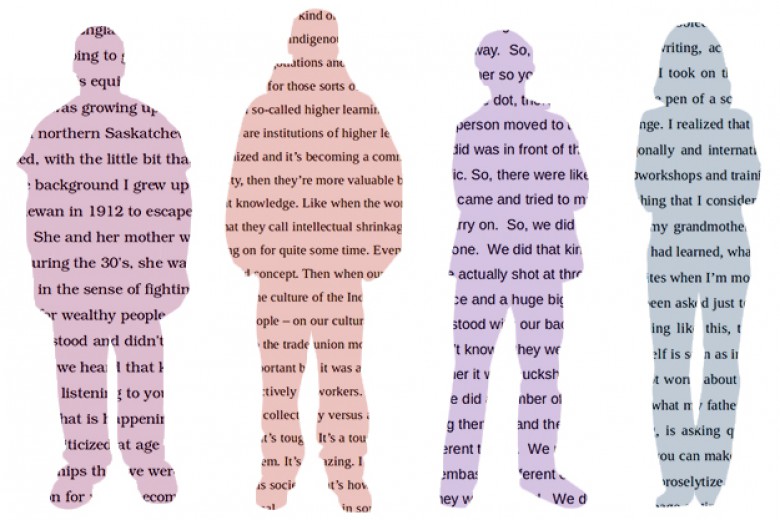
Many of us are hurting from the violence.
We hurt from the relentless onslaught of misogynistic violence – the colonial, racist violence against Indigenous, Black, and Muslim women; the terrorizing shootings at sites of women’s health care; the doubt surrounding testimonies of abuse; the everyday harassments that are thrust upon women to negotiate.
We hurt because queer folks and people of colour face the violence of having to justify their existence in a racist, homophobic, transantagonistic state, and they are killed at staggering rates when those justifications are deemed unsuitable by the self-appointed arbiters of social belonging. When people of colour and queer folks organize for justice and safety on university campuses, they are attacked and silenced for assaulting the right to free speech.
We reel from the violent displacements and chilling euphemisms of war that surge from border violence fuelled by military campaigns. We hear the violence of our neighbours and elected leaders lecturing about the need to be cautious about opening borders – “what if?” – all the while endorsing state violence against marginalized people.
We hurt from the violence embedded in the broadcasted rants of powerful people who wield politics of respectability to undermine politics of resistance. We hurt from the violence of those who howl about merit, flushed with the heat of insisting on the inadequacies of women, people of colour, and people with disabilities.
We hurt from the violence of gentrification and the normalization of unaffordable housing. We hurt from news headlines that describe anti-gentrification activists as a “class war hate mob.” We are deceived by landlords who promise to open a museum of women’s suffrage history and instead deliver one dedicated to a serial killer of sex workers.
We are parched, flooded, melted, and poisoned by de-humanizing oil-obsessed governance and industry models that rely on the violence of land grabs, climate change denial, and broken treaty promises to make their billions.
Under the weight of this violence, our communities fight. We resist, we organize, we strategize, we talk calmly to our friends, we lose it on our friends. We teach. We learn. We unlearn. We take power.
Much of the work of building resistance to violence is about telling stories. Stories help us organize and make sense of our lives, and they can reflect the ways we buck the limitations put on our lives. As Thomas King says, “The truth about stories is that that’s all we are.” In other words, our stories are how we tell our truths and speak about our experiences.
But King also warns us, “You have to be careful with the stories you tell. And you have to watch out for the stories that you are told.” The dominant stories, those of colonialism, racism, capitalism, and heteropatriarchy, have long propped up the social power and benefits of the hierarchy, control, and oppression that give rise to structural and interpersonal violence. As organizers and activists, much of our work is to flag these dominant stories as harmful.
While activism seeks to tell stories of the social good of justice, reconciliation, and solidarity, we too must be careful of how we tell our stories. If we’re frank, activist storytelling often reproduces oppression, good intentions notwithstanding. Master novelist Chimamanda Ngozi Adichie calls this “the danger of the single story”: when we are raised with the dominant stories of violence, we inherit oppressive prejudices, assumptions, and reflexes. In some ways, it’s inevitable. As Adichie says, “Show a people as one thing, as only one thing, over and over again, and that is what they become.” But as organizers and activists, it’s our work to flag the single stories in activism and tell better ones.
American social organizer, teacher, and storytelling theorist Marshall Ganz writes, “Stories not only teach us how to act – they inspire us to act. Stories communicate our values through the language of the heart, our emotions. And it is what we feel – our hopes, our cares, our obligations – not simply what we know that can inspire us with the courage to act.”
Ganz argues that activist stories reveal that social movements are, quite simply, a collective of people with shared values who are working on building alternatives to the status quo. In these stories, we can recognize ourselves in the movements that share our values.
Stories also help us recognize that we are not the only ones hurting from colonialism, racism, capitalism, and heteropatriarchy. What’s more, they help us recognize that the systems that hurt us are all related. Intersectional feminists reinforce these links continually: women’s liberation cannot occur without the liberation of the working class, people of colour, people with disabilities, and all others who are used and abused to maintain the production and reproduction of wealth, privilege, land ownership, and war.
I leave you with wisdom from Ganz: “Remember the art of story telling is in the telling, not in the writing. In other words, story telling is interactive, a form of social transaction, and can therefore only be learned by telling, and listening, and telling, and listening.” Go on. Tell your story, and tell it well.



